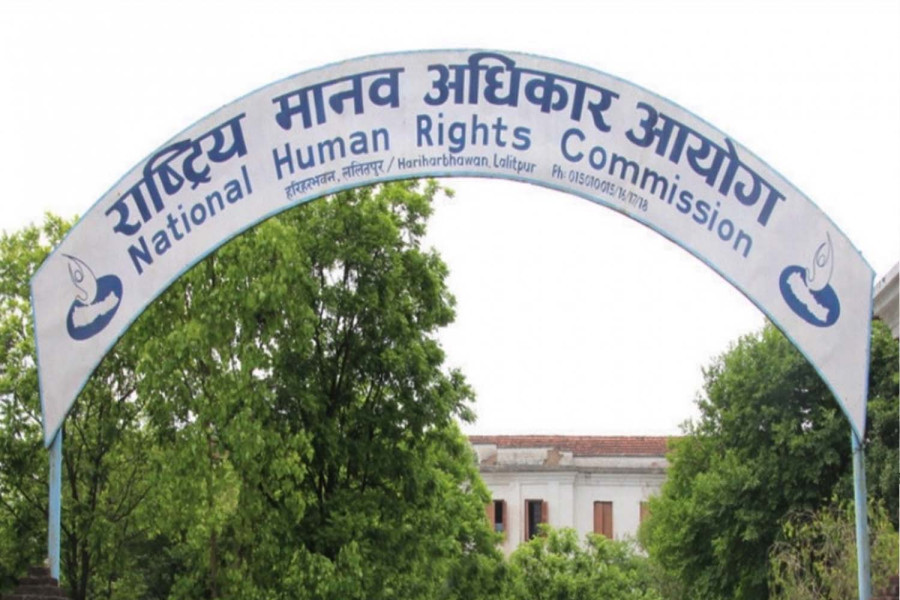National
As NHRC downgrade date approaches, pressure builds on office bearers to quit
A meeting of GANHRI later this month is set to downgrade the commission to ‘B’ category.
Binod Ghimire
With less than three weeks remaining for the Global Alliance of National Human Rights Institutions (GANHRI) to officially decide on downgrading the National Human Rights Commission from its global “A” ranking, human rights defenders in Nepal have asked the office bearers of the commission to do what they can to prevent the demotion.
Pointing to a serious flaw in the appointment of its chairperson and members, GANHRI in October last year had recommended the commission’s downgrade, to be effective in a year. A GANHRI meeting scheduled for October 23 to 27 will take the formal decision to downgrade the NHRC. GANHRI is an umbrella body of the human rights institutions from 127 countries.
After holding a review for two consecutive years, a GANHRI sub-committee on accreditation (SCA) had recommended downgrading the national human rights watchdog to “B” category. As per the GANHRI statute, it takes a year for the decision to be implemented.
“It would be unfortunate for the commission as well as for the country if it slips from the “A” category. I would suggest the chairperson and members of the commission resign,” said Charan Prasain, a human rights defender, during an interaction in the Capital on Monday. “The resignation would, hopefully, prompt GANHRI to rethink the downgrade decision. There would be no point in resigning after the decision comes into effect.”
The Constitutional Council led by the then Prime Minister KP Sharma Oli had nominated chairpersons and members at various constitutional bodies including the NHRC based on a revision in the Constitutional Council Act that had been effected through an ordinance on December 15, 2020. Based on the Council’s nominations, President Bidya Devi Bhandari on February 3, 2021 had appointed the chair and four commissioners at the NHRC. They were appointed without conducting parliamentary hearings in the absence of Parliament.
But civil society organisations protested against the appointments saying due process was not followed and also wrote to GANHRI. After the complaint, GANHRI in 2021 wrote to the commission asking if the appointments were in line with the Paris Principles. Adopted in 1993 by the United Nations General Assembly, the Paris Principles set six criteria that national human rights institutions need to follow. These include autonomy from the government and the independence guaranteed by the constitution besides adequate competence, pluralism and the availability of resources and powers to carry out investigations.
In its response the commission had argued that the Supreme Court was testing the legality of the appointments while also claiming that the appointments adhered to the Paris Principles.
The GANHRI accreditation sub-committee meeting in 2021 didn’t take any decision on the fate of the NHRC as it waited for the court order. However, as the court did not make any decision on the matter even in a year, the sub-committee in October 2022 recommended downgrading the NHRC to ‘B’ category.
At least half a dozen writ petitions challenging the ordinance and the constitutional appointments have been sub judice in the Supreme Court for around three years now. The next hearing on the petitions has been slated for December 6, which will be over a month after the GANHRI’s scheduled meeting.
“They decided to downgrade the NHRC’s status primarily because of the questionable appointment process,” said Renu Adhikari, a human rights defender. “So the chairperson and the members of the commission must clear the way by stepping down.” Human rights defenders argue that resignation by the existing office-bearers will clear the way for making new appointments at the NHRC by following the due process and help it retain the existing A status.
The office bearers of the commission, however, blame the state for failing to defend the appointments. “Our appointments alone are not responsible for the downgrade decision. The government’s failure to strongly defend the appointments before the United Nations Human Rights Committee is primarily responsible for the GANHRI action,” said Surya Dhungel, a member of the commission. He further claimed that the impending downgrade can still be averted if a bill to amend the NHRC Act to ensure administrative, economic and political autonomy to the commission, is endorsed immediately.
Of late, the commission has been lobbying the government and Parliament to introduce the bill and endorse it, but to no avail.
Speaking at the interaction in the Capital, some human rights defenders also argued that those who complained with GANHRI have only targeted the appointees without questioning the state mechanism that nominated them. “The complainants have only raised questions about the officer bearers while ignoring the mechanism involved in the appointment. It gives room to doubt their intentions,” said Sushil Pyakurel, a former member of the commission.
Only the country whose human rights commission is listed in the “A” grade can put forth its opinion in deliberations at the UN Human Rights Council and take part in voting on any of its decisions. Similarly, only such countries can contest or vote for the leadership position in GANHRI and the Asia Pacific Alliance of the Human Rights Institutions.
“It is saddening that the commission is losing its ‘A’ status it had maintained ever since its establishment. We have repeatedly told the chairperson and members to step down to save the commission from slipping to “B” grade, but they don’t listen,” a senior official at the commission, told the Post.




 9.7°C Kathmandu
9.7°C Kathmandu














